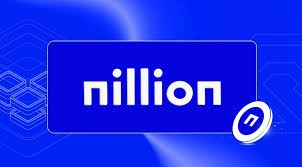Nillion Network: NIL & the Blind Compute Revolution
Table of Contents

In an era where data is gold — and data breaches are everywhere — privacy is no longer optional. Enter Nillion, pioneering the concept of a blind computer, where sensitive data can be stored and processed while remaining encrypted, even from the nodes performing computations. Its native token, NIL, anchors this privacy infrastructure by enabling staking, coordination, and network incentives.
In this article, we’ll walk you through Nillion’s architecture (nilChain, Petnet, blind modules), the NIL tokenomics, its developer tooling (APIs, SDKs, modules like nilDB / nilAI / nilVM), use cases from AI inference to secure analytics, and how to get started — including the recent airdrop, mainnet launch, and staking. Whether you’re a developer curious about privacy tech or a crypto investor seeking the next frontier, you’ll get a clear, structured guide to Nillion and its potential.
Let’s dive into how Nillion is redefining data sovereignty for Web3.
For more insights and updates on the latest trends in cryptocurrency, be sure to check out our Nifty Finances platform, which serves as your gateway to smarter financial decisions in the digital economy.

What Is Nillion & Its Vision
Nillion is a next-generation blind compute network that enables secure data processing and storage without exposing the underlying information. It represents a paradigm shift in how data privacy, computation, and decentralization intersect — offering a way for individuals and organizations to compute on encrypted data without ever decrypting it. This innovative approach to “blind computation” transforms how sensitive data can be shared, analyzed, and monetized in the Web3 ecosystem.
Definition: The Blind Compute Network
At its core, Nillion is a decentralized network for performing computations on fragmented and encrypted data. Unlike traditional distributed computing models, where nodes must access plain-text data to execute operations, Nillion introduces a privacy-first architecture where nodes perform computation without ever seeing the raw data.
This is achieved through Nil Message Compute (NMC) — a breakthrough cryptographic primitive developed by Nillion. NMC extends beyond traditional multi-party computation (MPC) by removing the need for inter-node communication during processing. Data is split into “particles” distributed across the network, and each node processes its fragment independently in a verifiable yet confidential manner.
The result is a trustless, high-performance blind computer that protects data confidentiality while maintaining computational efficiency and decentralization.
The “Blind Computer” Concept
The blind computer is the foundation of Nillion’s architecture — a decentralized virtual machine that can process encrypted data without the need for decryption.
This concept addresses one of the biggest challenges in Web3 and digital infrastructure today: how to compute, train, or analyze data while ensuring absolute privacy. By blinding the computation process itself, Nillion removes the inherent trade-off between utility and confidentiality that has long constrained data-driven innovation.
In essence, the blind computer allows developers, enterprises, and individuals to use data for computation while maintaining complete control and ownership. No node, third party, or centralized authority ever gains visibility into the underlying information, guaranteeing mathematical privacy at every layer.
Why This Matters: Use Cases in Privacy, AI, and Health Data
The implications of Nillion’s technology extend across industries where data privacy, compliance, and trust are essential.
- AI and Machine Learning: Models can be trained on encrypted datasets without revealing proprietary or personal information, unlocking secure AI collaboration between companies.
- Healthcare and Genomics: Sensitive medical or genetic data can be computed for research or diagnostics without ever leaving an encrypted form, ensuring patient confidentiality.
- Digital Identity and Authentication: Nillion enables decentralized identity systems where users can verify credentials or attributes without exposing personal data.
- Finance and Data Sharing: Financial institutions can perform risk assessments or fraud detection collaboratively without disclosing internal data sources.
By facilitating these use cases, Nillion introduces a new layer of privacy-preserving computation — a cornerstone for secure collaboration in an increasingly data-driven world.
Nillion’s Mission and Ethos
Nillion’s mission is to build the privacy layer for Web3 and beyond — a decentralized network that redefines trust, security, and ownership of data. The project’s ethos is rooted in data sovereignty, user empowerment, and mathematical trust, ensuring that privacy is not just a feature but a default state of computation.
Positioned at the intersection of privacy tech and distributed systems, Nillion envisions a future where individuals and enterprises can share and compute data safely, without intermediaries or surveillance risk. This vision places Nillion as a foundational layer for the next era of decentralized applications, where encrypted data becomes as usable as it is secure.
Nillion represents a new paradigm in decentralized computing — a blind network capable of performing powerful computations on encrypted data. Through its breakthrough technology and privacy-first mission, it redefines how data can be used, shared, and trusted across digital ecosystems. In an era defined by AI, data monetization, and privacy concerns, Nillion stands as a critical infrastructure for a more secure, transparent, and decentralized Web3 future.

Architecture & Core Components
The Nillion Network is a multi-layered decentralized architecture that blends cryptographic innovation with modular computation and storage infrastructure. Its design revolves around creating a trustless, privacy-preserving computation environment, allowing data to be processed in encrypted form. The system is composed of several interlinked layers — including the coordination layer (nilChain), the Petnet, and specialized processing and storage modules — all unified through advanced cryptographic primitives and interoperable interfaces.
Coordination Layer (nilChain)
At the heart of Nillion’s architecture is nilChain, the coordination and governance layer that orchestrates the network’s operations. NilChain functions as a blockchain-based control system, responsible for:
- Network Coordination: Managing task assignment and verifying computations performed on blind data fragments.
- Governance & Upgrades: Facilitating community-led decisions on protocol parameters, updates, and incentives.
- Payments & Settlements: Processing microtransactions for data usage, computation tasks, and rewards in Nillion’s native token, $NIL.
- Staking & Security Logic: Enforcing staking requirements for node operators and implementing slashing conditions for dishonest behavior.
NilChain ensures economic alignment and trust among participants — serving as the foundation for the blind compute economy.
Petnet & Processing / Storage Layers
Beneath nilChain lies Petnet, Nillion’s proprietary network layer for privacy-enhancing transactions and computations. Petnet connects the nodes that execute blind computation, store encrypted data, and maintain network redundancy.
Nillion’s processing and storage modules operate across three key components:
- nilDB: A decentralized database for encrypted data storage, optimized for privacy-preserving access and retrieval.
- nilAI: A framework enabling machine learning and AI operations on encrypted data without exposure.
- nilVM: A blind virtual machine that executes smart contracts and computational tasks over secret-shared inputs.
Together, these modules enable a complete confidential computing stack, allowing developers to build privacy-centric applications for industries like finance, healthcare, and AI.
Cryptographic Primitives
Nillion’s core innovation lies in its cryptographic underpinnings. The network integrates multiple primitives to achieve secure and efficient blind computation:
- Multi-Party Computation (MPC): Enables multiple nodes to jointly compute a function without revealing their individual inputs.
- Secret Sharing: Divides data into fragments (“particles”) that can be processed independently and recombined securely.
- Homomorphic Techniques: Allow arithmetic operations to be performed directly on encrypted data.
- Trusted Execution Environments (TEEs): Provide additional hardware-level isolation for certain workloads requiring verifiable integrity.
The combination of these techniques — particularly through Nillion’s Nil Message Compute (NMC) model — removes the need for inter-node communication during computation, drastically improving scalability and performance.
Node Roles & Clustering
Nillion’s network is composed of diverse node types, each contributing to decentralized performance and resilience:
- Orchestration Nodes: Manage task coordination and ensure data fragments are correctly distributed across compute nodes.
- Compute Nodes: Execute blind computations over secret-shared data fragments.
- Storage Nodes: Persist encrypted datasets within nilDB, maintaining redundancy and access control.
Nodes can form clusters that specialize in particular workloads — such as AI computation, private data analytics, or decentralized identity verification — optimizing network efficiency while preserving security and privacy.
Connectivity & Interoperability
To ensure broad adoption, Nillion is designed for interoperability with external blockchains and digital systems. The network exposes API layers and SDKs that allow developers and enterprises to integrate blind computation capabilities into their existing platforms.
Through cross-chain bridges and data oracles, Nillion can interact with major ecosystems such as Ethereum, Solana, and other EVM-compatible chains, enabling encrypted data verification, private contract execution, and multi-chain identity management.
This interoperability ensures that Nillion functions not as an isolated system, but as a universal privacy layer for Web3 and AI, bridging decentralized infrastructure with real-world applications.
The Nillion architecture is a sophisticated fusion of cryptography, distributed systems, and blockchain coordination. By combining nilChain’s governance, Petnet’s processing power, and blind computation modules like nilDB, nilAI, and nilVM, Nillion delivers an entirely new model for private, verifiable computation. Its layered design — governed by staking incentives and powered by interoperable cryptography — positions Nillion as a core infrastructure for privacy-preserving computation across decentralized and enterprise ecosystems alike.

Use Cases & Real-World Applications
Nillion’s blind compute network introduces a groundbreaking model for processing encrypted data. It enables computations to be performed without exposing raw information, creating real-world possibilities for privacy-preserving AI, data collaboration, and secure digital identity. By eliminating the need to decrypt, Nillion provides trustless privacy and utility in parallel — a rare combination in the Web3 ecosystem.
Private AI and Confidential Inference
AI models usually need direct access to unencrypted data to function effectively. This creates legal, ethical, and privacy challenges — especially in healthcare, finance, and research sectors.
Nillion’s blind compute layer addresses this by allowing AI models to run directly on encrypted data, ensuring that data privacy is never compromised.
- In healthcare, AI algorithms can analyze patient information without exposing personal records.
- In finance, institutions can perform risk analysis, fraud detection, or credit scoring without sharing raw customer data.
This privacy-first approach allows organizations to benefit from AI insights while remaining compliant with privacy laws such as GDPR and HIPAA.
Secure Analytics and Data Collaboration
Data silos prevent collaboration between organizations that could collectively generate valuable insights. Nillion enables multi-party computation where different entities contribute encrypted data to a shared computation process.
For example:
- Hospitals and research labs can jointly study genetic or clinical data to accelerate innovation without violating patient confidentiality.
- Global banks can collaborate on AML (anti-money laundering) analytics while keeping customer data secure.
This secure analytics layer helps unlock new opportunities for cooperation across traditionally closed sectors.
Privacy-Preserving Identity and Credentials
Centralized identity systems expose users to privacy risks and data breaches. Nillion’s framework supports privacy-preserving verification, where credentials are validated through encrypted computations.
Key benefits include:
- Users can prove eligibility (age, income, qualifications) without revealing personal details.
- Institutions can perform KYC or compliance checks without storing sensitive user data.
This creates a new standard for decentralized identity — one that empowers individuals and meets regulatory demands simultaneously.
Encrypted Marketplaces and Data Monetization
As data becomes a valuable commodity, the question arises: how can it be shared or sold without revealing its contents? Nillion enables encrypted marketplaces, where data owners retain full control while allowing others to compute insights over their datasets.
Possible applications include:
- Secure trading of anonymized health, IoT, or research data.
- Monetization of proprietary datasets where buyers only access analysis results, not the data itself.
These marketplaces could form the foundation for a privacy-preserving data economy, governed transparently through Nillion’s on-chain coordination layer.
Nillion’s real-world applications highlight a future where privacy and collaboration coexist. By separating computation from exposure, it offers a universal privacy infrastructure — one that protects individuals and enables industries to innovate with trustless, encrypted intelligence.
How to Participate & Get NIL
The Nillion ecosystem offers multiple ways for users, developers, and community members to get involved — whether through acquiring the native NIL token, participating in network operations, or contributing to protocol development. As the blind compute network continues to evolve, its structure is designed to be inclusive, transparent, and aligned with the broader Web3 privacy movement.
Acquiring NIL
The NIL token functions as the primary utility and governance asset within the Nillion network. It powers computation, incentivizes node participation, and facilitates on-chain coordination via nilChain.
Participants can obtain NIL through several methods, depending on availability and program stages.
- Exchanges – NIL will be listed on selected centralized and decentralized exchanges once liquidity pools are active, allowing users to trade using popular crypto pairs.
- Airdrop & Early Access – Certain community members, early testers, or developers may qualify for NIL airdrops or claim allocations through official campaigns.
- Allocation & Whitelisting – During initial network phases, eligibility for token access may depend on whitelisting, community participation, or contribution-based criteria.
Users are advised to follow official channels only for airdrop or sale announcements to ensure safety from phishing or scams.
Staking, Validators & Delegators
Nillion operates on a multi-layer architecture, where validator and compute nodes are essential to verifying, processing, and storing encrypted data fragments. By staking NIL, participants help secure the network and ensure reliable computation.
Validators must meet technical and staking requirements to operate nodes effectively:
- Maintain uptime, bandwidth, and security compliance to avoid penalties or slashing.
- Stake a minimum threshold of NIL tokens as collateral.
- Follow consensus participation rules for verification and coordination tasks.
Non-technical participants can also take part by delegating NIL to trusted validators, earning a portion of staking rewards. This creates a balanced system that welcomes both professionals and everyday holders into network governance.
Developer Participation
Developers are a core driver of Nillion’s growth. The network offers open-source frameworks and APIs to integrate privacy-preserving compute into decentralized or enterprise applications. Builders can engage in various ways:
- Develop applications using Nillion’s SDKs to enable blind computation in AI, identity, or DeFi products.
- Contribute to the codebase via GitHub, improving security, performance, or interoperability.
- Apply for grants through the Nillion developer program, which funds innovation around privacy infrastructure and data computation.
This open innovation model fosters a global developer community centered on secure and verifiable computing.
Community & Support
The Nillion community serves as the gateway for newcomers to learn, contribute, and stay informed. It maintains active channels across Discord, X (Twitter), and GitHub, where updates, technical discussions, and collaboration opportunities are shared.
Participants can:
- Join Discord to connect with validators, developers, and contributors.
- Explore the documentation portal for technical guides and node setup instructions.
- Follow community programs and educational initiatives to stay involved in governance or outreach.
Through a mix of participation pathways — from staking to development — Nillion ensures that anyone can contribute to a future where data privacy and compute utility coexist. Whether as a token holder, node operator, or builder, engaging with the NIL ecosystem means becoming part of the next frontier in decentralized privacy technology.
Nillion is pioneering a bold new paradigm — the “blind computer” — where data never needs to be decrypted to be processed. We walked through its architecture (nilChain, Petnet, blind modules), the role of NIL, its tooling ecosystem, practical use cases, and how early participants can engage. While the technical challenges and security demands are steep, Nillion’s promise is powerful: enabling privacy-first AI, analytics, and data systems that don’t compromise confidentiality.
If you’re a developer, privacy advocate, or crypto enthusiast, now is a prime moment to get involved. Claim your NIL (if eligible), explore the SDKs, join the community, test applications, and watch Nillion’s evolution. This is the frontier of data sovereignty — the blind compute era is just beginning. iExec is the opposite; iExec is Empowering Decentralized Privacy Computing that you can check.